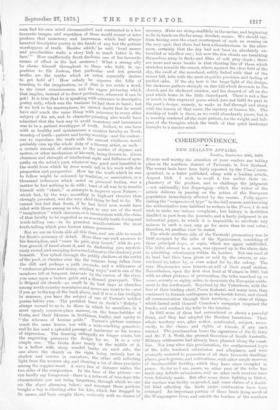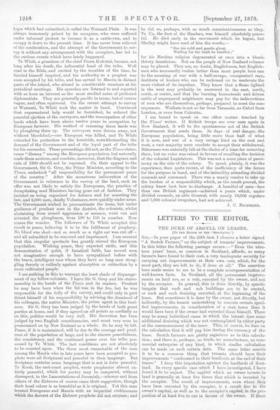CORRESPONDENCE.
NEW ZEALAND AFFAIRS.
The whole southern side of the Taranaki promontory was in 1860 occupied by the tribe of the Ngatiruanui, consisting of three principal hapic, or septa, which are again subdivided. The tribe, almost to a man, was opposed up to the above date to admitting colonisation within its borders. Not one rood of its land had then been given or sold by the owners, or sur- rendered to, taken by, or even asked for by, the colony. The very Missionaries were tenants-at-will of their small station. Nevertheless, upon the first shot fired at Waitara in 1860, but with no other pretence of provocation, the tribe marched up em ntasso, seventy or eighty miles, to devastate the European settle- ment to the northwards. Repulsed by the Volunteers, with the loss of their leading chief, Paora Kukutai, and many men, they continued to furnish contingents to the hostile forces, and closed all communication through their territory,—a state of things which lasted until General Cameron's campaign reopened the tracks, and confined the tribe to the interior.
In 1865 none of them had surrendered or shown a peaceful front, and they had adopted the Hauhau fanaticism. Their whole territory was, after notice, confiscated, subject, neces- sarily, to the claims and rights of friends, if any such existed. The proclamation bears the signatures of Sir G. Grey and Mr. F. A. Weld, the present Governor of South Australia. Military settlements had already been planted along the coast- line. Not long after this proclamation, the southernmost hort of the tribe tendered submission and allegiance, and were promptly restored to possession of all their favourite dwelling- places, peach-groves, and cultivations, with other ample reserves of inexhaustible fertility, which they have since occupied in peace. So far as I am aware, no other part of the tribe has made any definite submission, and no other such reserves have been definitely made. But after some fierce fighting in 1868-9, the warfare was tacitly suspended, and some claims of a doubt- ful kind affecting the lands under confiscation have been arranged. An important portion of these lands lying north of the Wainyongors river, and outside the borders of the southern halm which had submitted, is called the Waimati Plain. It was always immensely prized by its occupiers, who were suffered under informal protest to resume it as a cattle-run, and to occupy it down to the present time. It has never been relieved of the confiscation, and the attempt of the Government to sur- vey it without any arrangement with the occupiers, has led to the curious events which have lately happened.
Te Whiti, a grandson of the chief Paora Kukutai, became, not long after his death, the influential head of the tribe. Well read in the Bible, and excited by the troubles of the time, he fancied himself inspired, and his authority as a prophet was soon accepted by his tribe, and has spread to Maoris in distant parts of the island, who attend in considerable numbers at his periodical meetings. His speeches are listened to and reported with as keen an interest as the most studied notes of profound diplomatists. They are generally pacific in terms, but of course vague, and often equivocal. On the recent attempt to survey at Waimati, Te Whiti took the matter in hand. Convinced that supernatural help would be furnished, he ordered the peaceful ejection of the surveyors, and the reoccupation of other lands which have been above twelve years in occupation by European farmers. His method of resuming these lands was by ploughing them up. The surveyors were driven away, not without bloodshed,—one .European was killed, and Te Whiti extended his protection to the homicide, notwithstanding the demand of the Government and of the loyal part of the tribe for his surrender. These proceedings did not, as the Times states, cause " dismay " among the European population, but naturally made them anxious, and resolute, moreover, that the disgrace and ruin of 1860 should not be repeated. On their appeal to the Government, Sir G. Grey, the Prime Minister, according to the Times, undertook "all responsibility for the permanent peace of the country." After the monstrous indiscretion of the Government in reference to the survey of the land, such an offer was not likely to satisfy the Europeans, the practice of decapitating mad Ministers having gone out of fashion. They insisted on being organised for defence and for asserting the law, and 2,000 men, chiefly Volunteers, were quickly under arms. The Government wished to procrastinate the issue, but under guidance of prudent men in the district, the colonists, whilst abstaining from armed aggression or menace, went out and arrested the ploughmen, from 100 to 150 in number. Now comes the wonder. The followers of Te Whiti accepted this result in peace, believing it to be the fulfilment of prophecy. No blood was shed—not so much as a right ear was cut off— and all submitted to be removed and imprisoned. 1 am assured that this singular spectacle has greatly stirred the European population. Wishing peace, they expected strife, and this demonstration of quiet, if fanatical faith, has moved men not imaginative enough to have sympathised before with the brave, intelligent race whom they have so long seen strug- gling fiercely or sullenly against absorption or extinction by a more cultivated people.
I see nothing in this to warrant the least shade of disparage- ment of my fellow-colonists. I leave Sir G. Grey and his states- manship in the hands of the Times and its readers. Prudent he may have been when the fat was in the fire, but he was responsible for the folly of the survey, and could only in part divest himself of his responsibility by advising the dismissal of his colleague, the native Minister, the prime agent in this busi- ness. Sir G. Grey has been judged by the heads of both great parties at home, and if they agreed on all points as cordially as on this, politics would be very dull. His discretion has been judged by two English constituencies, and must very soon be pronounced on by New Zealand as a whole. So he may be left. Peace, if it is maintained, will be due to the courage and prud- ence of the population at large, and to the sincere peacefulness, the consistency, and the continued power over his tribe pos- sessed by Te Whiti. The last conditions are not absolutely to be counted upon. The three most remarkable of the men among the Maoris who in late years have been accepted as pro- phets were all Scriptural and peaceful in their language. But Scripture contains some language that is not in form peaceful. Te Kooti, the east-coast prophet, wrote prophecies almost en- tirely peaceful, which for poetry may be compared, without disrespect, to the Lamentations of Jeremiah,—whence and from others of the Hebrews of course came their suggestion, though their local colour is as beautiful as it is original. Yet this man treated Europeans and Maoris with an impartial ruthlessness which the fiercest of the Hebrew prophets did not surpass; and he did so, perhaps, with as much conscientiousness as they. To ha, the first of the Hauhau, was himself absolutely peace- ful. He died early in the movement which ho began, but Shelley might have used of him the words,— " See his mild and gentle ghost, Wailing for the faith he kindled ;" for his Hauhau religion degenerated at once into a blood- thirsty fanaticism. But on the people of New Zealand reliance may be placed. They are, no doubt, Englishmen, but English- men who necessarily realise better than most people here can do the meaning of war with a half-savage, unorganised race, destitute of leaders who can be reckoned on to moderate the most violent of its impulses. They know that a flame lighted in the west may probably be answered in the east, north, south, or centre, and that the burning homesteads and driven cattle of unprepared neighbours may pay for the indiscretions of men who are themselves, perhaps, prepared to meet the con- sequences. Waikato is not so far from Taranaki, as Cabal from London, or even from Calcutta.
I am bound to speak on one other matter touched by the Times' writer. If British troops are ever seen again in New Zealand, it will be the spontaneous act of the British Government that sends them. In days of real danger, the European population, being little more than half of what it is now, and war of a very savage kind on the east and west, a vast majority were resolute to accept their withdrawal. Bitterness was naturally felt at the choice of a time for removing them, but no voice was raised in favour of recalling the decision of the colonial Legislature. This was not a mere piece of parsi- mony on the side of the colony. To speak plainly, it was the experience, then quite recent, of the inefficiency of the forces for the purpose in hand, and of the imbecility attending divided counsels and command. There was a manly resolve to take up the burden of a responsibility which, as the result proved, the colony knew best how to discharge. A handful of men—less than one British regiment—achieved a peace which, under divided counsels, an able General, with nearly 10,000 regulars. and 5,000 colonial irregulars, had not achieved.
J. C. RICHMOND.



































 Previous page
Previous page